I'm looking for way to open registry editor and show some specific key or value. For example, if I pass "HKLM\\SOFTWARE\\Skype\\Installer" I want to get such a result:
All suggestions except system() calls are welcome.
I'm looking for way to open registry editor and show some specific key or value. For example, if I pass "HKLM\\SOFTWARE\\Skype\\Installer" I want to get such a result:
All suggestions except system() calls are welcome.
Just call system. To use Raymond Chen's words: It rather involved being on the other side of this airtight hatchway. Any relevant attack requires compromising the machine to the point that your system call is utterly irrelevant. In fact, any attacker that can change RegEdit can change your program as well, so he could just add that system call. (Which he won't, since it is pointless anyway)
Here is, what I needed.
String GetFullHKEY (HKEY hKeyRoot)
{
if (HKEY_LOCAL_MACHINE == hKeyRoot) return _T("HKEY_LOCAL_MACHINE\\");
if (HKEY_CLASSES_ROOT == hKeyRoot) return _T("HKEY_CLASSES_ROOT\\");
if (HKEY_CURRENT_CONFIG == hKeyRoot) return _T("HKEY_CURRENT_CONFIG\\");
if (HKEY_CURRENT_USER == hKeyRoot) return _T("HKEY_CURRENT_USER\\");
if (HKEY_USERS == hKeyRoot) return _T("HKEY_USERS\\");
}
bool RegistryGoTo (HKEY hKeyRoot, const String &lpctPath, String lpctValue)
{
if (lpctPath.empty() || 0 == hKeyRoot)
return false;
if( lpctValue.empty() && lpctValue.empty() == 0)
{
lpctValue.clear();
}
SHELLEXECUTEINFO shi = { 0 };
DEVMODE dm = { 0 };
HWND hWndRegedit = ::FindWindow (_T("RegEdit_RegEdit"), NULL);
if (NULL == hWndRegedit)
{
shi.cbSize = sizeof(SHELLEXECUTEINFO);
shi.fMask = SEE_MASK_NOCLOSEPROCESS;
shi.lpVerb = _T("open");
shi.lpFile = _T("regedit.exe");
shi.nShow = SW_SHOWNORMAL;
ShellExecuteEx (&shi);
if( GetLastError() != 0 )
{
Sleep(200);
ShellExecuteEx (&shi);
}
WaitForInputIdle (shi.hProcess, INFINITE);
hWndRegedit = ::FindWindow (_T("RegEdit_RegEdit"), NULL);
}
if (NULL == hWndRegedit) return FALSE;
SetForegroundWindow (hWndRegedit);
ShowWindow (hWndRegedit, SW_SHOWNORMAL);
HWND hWndTreeView = FindWindowEx (hWndRegedit, NULL, _T ("SysTreeView32"), NULL);
SetForegroundWindow (hWndTreeView);
SetFocus (hWndTreeView);
for (int i = 0; i < 30; i++)
{
SendMessage (hWndTreeView, WM_KEYDOWN, VK_LEFT, 0);
}
dm.dmSize = sizeof (DEVMODE);
EnumDisplaySettings (NULL, ENUM_CURRENT_SETTINGS, &dm);
if (8 < dm.dmBitsPerPel) Sleep (100);
// the path must start with a backslash
String stRegPath = String (_T("\\")) + GetFullHKEY(hKeyRoot) + lpctPath;
// open path
for (int iIndex = 0; iIndex < (int) stRegPath.length (); iIndex++)
{
if (_T('\\') == stRegPath [iIndex])
{
SendMessage (hWndTreeView, WM_KEYDOWN, VK_RIGHT, 0);
if (8 < dm.dmBitsPerPel)
Sleep (100);
}
else SendMessage (hWndTreeView, WM_CHAR, toupper (stRegPath [iIndex]), 0);
}
SetForegroundWindow (hWndRegedit);
SetFocus (hWndRegedit);
if (lpctValue.length())
{
HWND hWndListView = FindWindowEx (hWndRegedit, NULL, _T("SysListView32"), NULL);
SetForegroundWindow (hWndListView);
SetFocus (hWndListView);
Sleep (100);
SendMessage (hWndListView, WM_KEYDOWN, VK_HOME, 0);
String stValue = lpctValue;
for (String::iterator it = stValue.begin (); it != stValue.end (); ++it)
{
SendMessage (hWndListView, WM_CHAR, toupper (*it), 0);
}
}
return true;
}